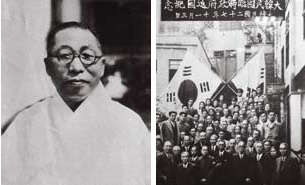Everyone's Favorite Bunsik, Have You Tried All?
Bunsik, literally meaning "food made from flour", is a term that refers to a Korean snack that is commonly peddled. Most popular bunsik include gimbap, tteokbokki and eomuk (fish cake). Bunsik can be easily found in traditional markets, street vendors, and around popular tourist spots or shopping areas. Here are some of the most well-known and favored bunsik by both Koreans and foreign tourists. Have you tried all of them? Several snacks have also become hits in Indonesia.
1. Gimbab
Gimbap
or rice rolls are made from rice flavored with vinegar, sugar and salt. The
rice is then placed on the gimbab mold. Pieces of egg, eomuk, carrots, spinach
and pickled radish are then placed in the middle of the rice to roll into a
cylinder shape. The rolls were then cut into pieces. Gimbap is the perfect food
choice for lunch or picnics.
2. Buchimgae / Jeon
Buchimgae
and jeon refer to pancake-like dishes in Korean cuisine. Meat, seafood,
vegetables, and eggs mixed with flour mixture then sauteed with oil. Each jeon
gets its name from the main ingredients it uses, such as pajeon (green onion pancake),
kimchi jeon (kimchi pancake), and bindaetteok (green bean pancake). The
combination of jeon and makgeolli (Korean rice wine) is a Korean favorite when
it rains.
3. Tteokbokki
Tteokbokki
is one of the most common snacks sold by street vendors. Rice cake with eomuk
and vegetables cooked in red chili sauce which is spicy but has a sweet taste.
A variety of fusion tteokbokki can also be found, including tteokbokki made
using jjajang (black bean sauce) or topped with garlic.
4. Sundae
Sundae
is a traditional sausage made from layers of pork intestines filled with a
mixture of tofu, vegetables and glass noodle. It's usually dipped in spiced
salt and in some areas served with ssamjang, a paste mixed with gochujang and
doenjang (fermented soybean paste). Sundae can also be made using cuttlefish as
a substitute for pork intestines or the glass noodle is replaced with sticky
rice.
5. Eomuk
The
main ingredient of Eomuk consists of ground fish meat. It is usually skewered
and stewed in radish and spring onion broth. Eomuk is very popular as a winter
snack.
6. Twigim
Twigim
is a generic term for a fried dish covered in flour and egg batter. Squid,
dumplings, potatoes, shrimp, and various kinds of vegetables are the main
ingredients. It tastes better dipped in soy sauce or tteokbokki sauce.
7. Hotteok
Hotteok
are chewy pancakes, usually filled with various combinations of sugar and
walnuts or pine nuts. Some hotteok are filled with vegetables or cheese. A
popular street food found mostly in winter.
8. Jwipo / Dried Squid
Jwipo
is made from thread-sail filefish which is flattened and dipped in sauce then
dried. Jwipo and dried squid are usually grilled over a fire before consumption
to add to their sweet and savory taste.
9. Kkochi
Kkochi
refers to cooking satay (skewers of meat). The most common kkochi is dak
kkochi, or chicken satay. Small pieces of chicken and vegetables are skewered,
coated in sauce, then grilled. Sausage, fish cakes, and tteokgalbi (rice cakes
and grilled ribs) are also often used as ingredients for making kkochi to add
variety to kkochi.
10. Bungeo PPang / Gukhwa Ppang /
Gyeran Ppang
Bungeo
ppang, a favorite winter snack, gets its name from its fish-like shape. This
sweet snack is formed into goldfish, which in Korean is called bungeo. Pancake
batter is filled with red bean paste, cream or cheese and then baked. Gukhwa
ppang is shaped like a flower and slightly smaller than bungeo ppang which
tastes similar. Gyeran ppang is also made from pancake batter and on top of it
is egg filling with a savory taste and a soft texture.
11. Hoppang
This
hoppang or Korean dumpling is one of the most popular warm snacks in winter.
These are rice flour balls that have been cooked with various fillings, such as
red bean paste, vegetables, minced meat and others. Hoppang is usually steamed
to keep warm and is sold on the streets and in convenience stores.














Komentar
Posting Komentar